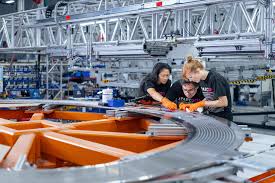
Breaking News
 "This is Fraud!" – Nick Shirley Releases His Latest Investigation Into Somali Welfare Frau
"This is Fraud!" – Nick Shirley Releases His Latest Investigation Into Somali Welfare Frau
 Watch Live at 4:30 ET: Tina Peters' Appeal..
Watch Live at 4:30 ET: Tina Peters' Appeal..
 Losing Chickens? Tools Needed for Trapping Poultry Predators
Losing Chickens? Tools Needed for Trapping Poultry Predators
 Metals Tell the Truth About the Economy
Metals Tell the Truth About the Economy
Top Tech News
 Superheat Unveils the H1: A Revolutionary Bitcoin-Mining Water Heater at CES 2026
Superheat Unveils the H1: A Revolutionary Bitcoin-Mining Water Heater at CES 2026
 World's most powerful hypergravity machine is 1,900X stronger than Earth
World's most powerful hypergravity machine is 1,900X stronger than Earth
 New battery idea gets lots of power out of unusual sulfur chemistry
New battery idea gets lots of power out of unusual sulfur chemistry
 Anti-Aging Drug Regrows Knee Cartilage in Major Breakthrough That Could End Knee Replacements
Anti-Aging Drug Regrows Knee Cartilage in Major Breakthrough That Could End Knee Replacements
 Scientists say recent advances in Quantum Entanglement...
Scientists say recent advances in Quantum Entanglement...
 Solid-State Batteries Are In 'Trailblazer' Mode. What's Holding Them Up?
Solid-State Batteries Are In 'Trailblazer' Mode. What's Holding Them Up?
 US Farmers Began Using Chemical Fertilizer After WW2. Comfrey Is a Natural Super Fertilizer
US Farmers Began Using Chemical Fertilizer After WW2. Comfrey Is a Natural Super Fertilizer
 Kawasaki's four-legged robot-horse vehicle is going into production
Kawasaki's four-legged robot-horse vehicle is going into production
 The First Production All-Solid-State Battery Is Here, And It Promises 5-Minute Charging
The First Production All-Solid-State Battery Is Here, And It Promises 5-Minute Charging
Is the world ready for the transformational power of fusion?

Imagine:
One day in the early 2030s, an engineer at a newly constructed power plant near Richmond, Virginia, in the United States, will press a button. It will ignite the same reaction that takes place in our sun's core.
Inside a doughnut-shaped machine called a 'tokamak,' hydrogen isotopes will collide at enormous speed, fusing into helium. This reaction will produce 400 megawatts (MW) of clean, firm electricity, enough for a small city. This electricity will hit Virginia's power grid nanoseconds later, making nearby residents the first human beings to benefit from commercial fusion power generation.
By the time their children retire, fusion may be the world's dominant energy source, ushering in an era of energy abundance, not scarcity. And it will be the cheapest reliable power, and incidentally, the cleanest power too.
Fusion is the future of the global energy sector — the near future. While it may not happen exactly as we've just described, the first fusion power plant will almost certainly begin operations shortly after President-elect Trump's second term expires.

 Storage doesn't get much cheaper than this
Storage doesn't get much cheaper than this

